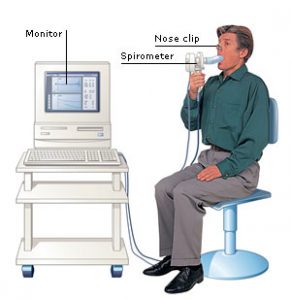
17 Oct Testing your lungs: spirometry
A spirometry test measures how healthy your lungs are and can be used to help diagnose and monitor lung conditions. During the test, you will breathe out as much air as you can, as hard as you can, into a device called a spirometer. The test measures how much air you can blow out in total and how much air you can blow out in the first second of the test. The test should not be painful and usually takes less than 10 minutes
Should you take a test?
Yes, if:
- You smoke, or you used to smoke
- You cough a lot
- You become short of breath when walking quickly
- You are worried about the health of your lungs
- You are already receiving treatment for a lung condition
What happens during the test?
Your healthcare professional will show you how to blow into the spirometer before you begin. You may need to wear a soft clip over your nose to stop air leaking out of your nostrils. Before starting the test, you might be asked to breathe in deeply and out gently into the spirometer. You will then be asked to blow at least three times, but usually no more than 10 times, into the spirometer.
During the spirometry test, you must:
- Breathe in as deeply as you can and place your lips tightly around the mouthpiece.
- Try your hardest and blast out your air as quickly as possible.
- Keep blowing out until your lungs are empty and your healthcare professional tells you to stop
Understanding your results
Your healthcare professional will use your results (FEV1 and FVC) to decide how well your lungs are working. If the amount of air you can blow out during the first second is low, you may have a narrowing of your airways, possibly due to asthma or chronic obstructive lung disease (COPD). If you are already receiving treatment for asthma or COPD (such as an inhaler), the spirometry test can be used to check that the treatment is helping your lungs to work as well as possible. The test may also be useful to rule out some other lung conditions
Will I need any more tests?
The spirometry test is an important measure of lung function. If your symptoms vary (for example with asthma) you may be asked to repeat the test at different times, in which case you could take note of your results so you know what is a normal result for you. If you have an ongoing lung condition regular spirometry may be used to monitor it. In addition, you may be asked to carry out some more tests if the doctor needs to investigate further. Spirometry can also be part of other lung function testing, like an exercise test or a bronchial challenge test.
If you would like to read the full article is in the reference below.
References
Testing your lungs: spirometry. Breathe Sep 2018, 14 (3) 257-260; DOI: 10.1183/20734735.ELF143 http://breathe.ersjournals.com/content/breathe/14/3/257.full.pdf


